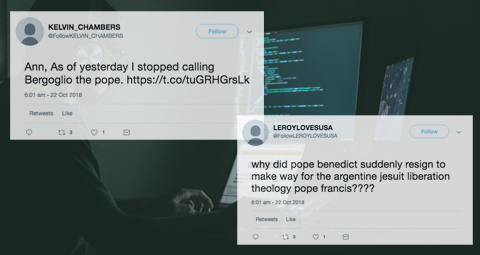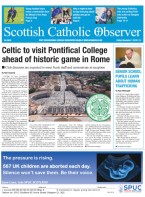BY Daniel Harkins | October 26 2018 | ![]() 0 COMMENTS
0 COMMENTS ![]() print
print

Russian-backed trolls may have tried to divide Catholics over Pope Francis’ papacy
Publication Date: 2018-10-26
SCO research reveals tweets from Russian troll farm exploited division in the Church to spread discord
Online trolls backed by the Russian Government may have sought to divide Catholics over the papacy of Pope Francis, according to research.
An analysis by the SCO of Tweets, suspected by Twitter of being from the Russian-state backed Internet Research Agency, show more than 2,000 mentioned Pope Francis or the Pope, and 874 used the word ‘Catholic.’
While researchers have said it’s unlikely the Church was directly targeted, the trolls may have used Pope Francis to create division in society and between Catholics.
Twitter released millions of Tweets it believes to be associated with the Internet Research Agency after a US Justice Department investigation into Russian meddling in the 2016 presidential election.
Based in St Petersburg, the organisation sent out millions of Tweets, and is accused of seeking to manipulate election results around the world, including the Scottish independence and Brexit referendums.
A data set of three million Tweets was compiled by two professors at Clemson University in the United States: Darren Linvill and Patrick Warren.
Using advanced social media tracking software, they pulled the tweets from thousands of accounts that Twitter has acknowledged as being associated with the Internet Research Agency, and published them through the website fivethirtyeight.com.
Tweets
Of the thousands of Tweets that mention the Pope, a significant number focus on immigration, the environment and Islam. Most are related to US politics, and use the Pope’s words to promote a US political position.
Some are direct attacks on the Holy Father, highlight the abuse crisis in the Church, focus on Catholic positions on LGBT issues, or stress divisions between Christianity and Islam.
One troll account called the Pope a ‘rabid left-wing globalist’ in a retweet and said: “This Pope has destroyed Catholicism. My church has left me but my faith remains.”
One account retweeted ‘As of yesterday I stopped calling Bergoglio the pope,’ and linked to a traditionalist Catholic blog, while others linked to articles arguing for the Pope’s ‘progressive’ reforms.
Three troll accounts mentioned liberation theology (above), with one retweeting, ‘why did Pope Benedict suddenly resign to make way for the Argentine Jesuit liberation theology Pope Francis?,’ while another referred to the pontiff as an ‘Argentinian Lefty.’
Another referred to Pope Francis as a ‘false prophet,’ another said the ‘Lunatic Pope was ‘on a collision course with the Catholic Church,’ and two trolls retweeted: “How I miss the theological clarity of Pope Benedict XVI.”
“Correct interpretation of ‘The Joy of Love’: Pope questioned by cardinals on easing attitude to divorcees,” one tweet which linked to a news article read.
Another praised the Pope as ‘one of the most progressive,’ while another labelled him a ‘hysterical social justice warrior.’
Putin
Around 15 tweets referred to the Pope and Vladimir Putin—‘Vladimir The Great Sums Up Pope Francis The Fake!’—while one masquerading as a Christian repeatedly urged the Pope to stay out of politics.
Some pro-LGBT accounts criticised the Holy Father as being homophobic while many highlighted the Pope’s pro-refugee stance, with one writing: “Lunatic Pope on a collision course with the Catholic Church with his support of Islamic immigration to Europe.”
Professor Warren, who compiled the three million Tweets, said the main strategy of the troll accounts was division.
“They want our society to seem more extremist and divided than it really is and allow perception to drive reality. They want us to be focussed on our internal divisions so they can have free rein to exert/expand their influence unchecked,” he said.
Asked why the accounts would attack Pope Francis, he said: “The Internet Research Agency never create divisive social issue from whole cloth. They co-opt already existing divisions. Here, I suspect they are taking advantage of the split between more conservative Catholics and the more progressive track that Pope Francis has charted.”
Professor Warren added that the trolls may have been using Pope Francis’ pronouncements on the environment and immigration to further their own agenda of political division.
He said that immigration is a regular topic co-opted by the trolls, so he was ‘not surprised to hear that that general pattern extends to the case of Pope Francis,’ and that they may have been using the Holy Father’s words on the environment to attack science.
Ben Nimmo, a senior fellow at the Atlantic Council’s digital forensic research lab, said there is no ‘reasonable doubt’ that the Tweets from the St Petersburg company were made with the ‘awareness of the Russian government and the coordination sometimes with the Russian diplomatic service.’
But he cautioned that the Pope Francis tweets were unlikely to be a direct attack on the Holy Father.
He said some of the accounts tweeting about Pope Francis were posting stories about the pontiff to masquerade as legitimate news sites, so that at a later date they could spread false stories, while others would be trying to ‘stay in character’ as a person with particular political views.
The Russian-based trolls, he said, would be unlikely to have the depth of knowledge about the Church necessary to orchestrate a divide in the Catholic community.
However, he said it was possible that the trolls could have been attacking Pope Francis in an effort to ‘trigger Catholic communities and to get Catholic communities to attack each other,’ or to ‘widen the divide between the Catholic community’ and others such as the LGBT community.
“I don’t see any specific targeting of the Catholic Church at the moment but [the issue] is something that everyone who uses a smartphone or computer needs to be aware of,” he added.
“State-sponsored trolling is on the rise. We can only speculate but when you have an organisation which has a global reach and has different interests and communities in different countries and there is a long history of people taking offence at what it does then the potential is there for organised trolling.
“In a Catholic context, have a think about where the Catholic Church is present but is not particularly looked on in favour of by the government. That is a situation where it would be worth considering what kind of online traffic you are getting.
“But it is important to remember that the state-sponsored trolling is a minority of traffic. We all need to be aware, rather than we all need to be afraid.”










